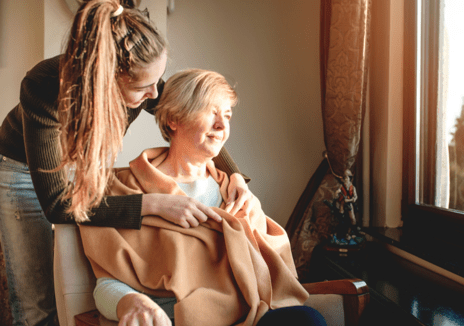As a Doctor of Nursing, I have had numerous opportunities to help senior men and women with varying levels of care, including hospice. When a patient begins receiving hospice care, it is typically a very physically, mentally, and emotionally trying time for the hospice patient’s family members, family caregivers, and hired caregivers.
Considering November is Home Care and Hospice Month, I think it is important to review some helpful tips for caregivers working collaboratively with hospice staff.
Hospice care is administered to support people who are dying. This doesn’t mean that the patient is expected to die within a specific time frame, but it is designed to make the patient more comfortable as they near the end of their life, whether the patient is at home, under skilled nursing care, or in a hospice facility.
Caregivers, be they family members, private, or professional, play an important role in providing supportive services. These responsibilities include but are not limited to:
- Emotional Support for clients and their families
- Practical Support with personal care like bathing, dressing, and feeding clients. Moreover, when under the supervision of hospice care nurses or family members, caregivers may administer medications and manage pain and comfort measures.
- Respite Care supports the spouse and family caregivers giving them a break from caregiving and allowing them to rest and recharge as a measure of self-care.
The following are 4 helpful tips for caregivers working collaboratively with hospice:
- Follow the care plan carefully. If anything is unclear, please ask family members or hospice nurses. For Home Helpers caregivers, our administrative staff is also available to address your concerns.
- Understand hospice care protocols. Administration of comfort measures such as pain medication and oxygen supplementation MUST be under the supervision of a Registered Nurse (RN) or family members. Always double-check the orders before proceeding with care.
- Know who to call during a medical emergency. Always call the hospice care nurse first then call family members. DO NOT CALL 911! For Home Helpers caregivers, reach out to our administrative staff after calling the hospice nurse so we can provide support by contacting family members.
- Practice self-care to stay strong physically and emotionally. Get enough sleep, eat healthy foods, and exercise regularly. It is also important to find time for activities you enjoy and talk to someone about how you’re feeling.
I provide training on hospice care for my team of Home Helpers caregivers, so everyone is prepared to assist clients, families, and hospice care staff. I am proud to say that we have highly skilled caregivers who are skillfully trained and more than capable of providing in-home care services for clients placed in hospice care no matter if they are home or in a facility.
Home Helpers® Hospice Care Support Services include:
- Respite for family caregivers
- Light housekeeping & laundry
- Medication reminders
- Emotional & spiritual support
- Meal preparation and feeding
- Post-operative care
For family members in need of respite, I am pleased to offer a FREE Consultation to assess specific needs and create a personalized care plan customized for seniors in hospice care to give you a break and make life easier for everyone’s peace of mind.
Home Helpers® Wheaton & Naperville is proudly Making Life Easier℠ for veterans, differently-abled, and senior men and women in Aurora, Bartlett, Bloomingdale, Hanover Park, Hoffman Estate, Roselle, Itasca, Medinah, Naperville, Plainfield, Schaumburg, Warrenville, West Chicago, Wheaton, and Winfield.

